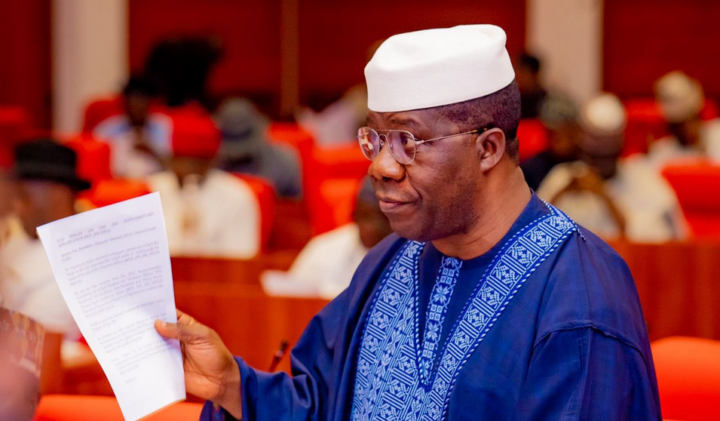BREAKING NEWS

HOW MY WIFE HELPED ME ESCAPE ABACHA’S MEN IN AN AMBULANCE – SENATE LEADER BAMIDELE SHARES UNTOLD STORY
As Nigeria marked Democracy Day, Senate Leader Opeyemi Bamidele took a walk down memory lane, sharing the gripping and emotional story of how he narrowly escaped the grip of the Abacha military regime—with the help of his wife and a hospital ambulance.
In a statement released to commemorate June 12, Bamidele recounted how, in the thick of Nigeria’s struggle for democracy, he had to be smuggled out of Abuja in an ambulance from Garki General Hospital, where his wife, Pharmacist Yemisi Bamidele, worked at the time.
“There was no GSM then,” he said, reflecting on the 90s era. “We relied on landlines and word of mouth. One of the lawyers in my office had to rush to the NUJ Secretariat to call my wife, because he couldn’t reach me directly.”
At the time, Bamidele was in court defending 11 student union leaders from the University of Abuja, who had been expelled for their activism. Midway through the court session, an assistant registrar delivered a quiet but urgent message: security operatives had stormed his law office in Wuse II, Abuja, accusing him of hiding weapons.
Realizing the risk he was in, Bamidele quickly handed over the case to a colleague and reached out to his wife. Yemisi, understanding the danger, moved fast. She arranged for an ambulance from her hospital to come pick him up, disguising his exit under the pretense of a medical emergency.
“She literally rescued me,” Bamidele said. “The ambulance took me to a safe location, where a friend was waiting to drive me out of town. We couldn’t use the airport—it was under heavy surveillance by the military. That journey lasted nearly three days.”
His ordeal didn’t end there. After evading capture in Abuja, he couldn’t return to his home in Lagos either. Word had spread that other pro-democracy figures like Dr. Beko Ransome-Kuti and Chief Femi Falana had their offices raided the same day.
“It was a coordinated manhunt,” he said. “They were going after lawyers, activists—anyone they considered a threat.”
Eventually, Bamidele connected with NADECO’s underground network, which helped political dissidents flee the country. He made his way to Badagry, crossed the border into Cotonou in a canoe at night, and then continued on to Ghana. From Accra, he secured a flight ticket—thanks to contacts in exile—and finally landed in the United States, where he was granted political asylum.
“It was in the U.S. that I joined other comrades in exile, continuing our resistance against the military junta,” Bamidele added. “That chapter of my life was dangerous, but it shaped my convictions about democracy, justice, and the rule of law.”
The Senate Leader’s account highlights the personal cost many paid for Nigeria’s democracy—a powerful reminder that behind the public holidays and celebrations are stories of courage, sacrifice, and survival.
"This represents a significant development in our ongoing coverage of current events."— Editorial Board









